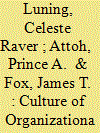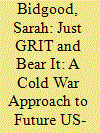| Srl | Item |
| 1 |
ID:
186342


|
|
|
|
|
| Summary/Abstract |
With the backdrop of the utility of grit at the individual level, speculation has begun to circulate that grit may exist as an organizational level phenomenon. To explore this potential construct, this study used an exploratory, qualitative research design. This study explored grit at the organizational level by interviewing leaders’ perceptions of what may be a culture of organizational grit. Participants included 14 U.S. military officers. Seven themes emerged relative to the research question: “What do U.S. military officers perceive as a culture of organizational grit?” Themes included professional pride, team unity, resilience-determination, mission accomplishment, core values, growth mindset, and deliberate practice. This study indicated that a culture of organizational grit is likely a combination of converging organizational elements. Overall, findings indicate that there may be a culture of organizational grit in the military and at the least, more research examining the concept is warranted.
|
|
|
|
|
|
|
|
|
|
|
|
|
|
|
|
| 2 |
ID:
058787


|
|
|
|
|
| Publication |
Fall-Winter 2004.
|
|
|
|
|
|
|
|
|
|
|
|
|
|
|
|
| 3 |
ID:
179374


|
|
|
|
|
| Summary/Abstract |
Even at the height of the Cold War, Washington and Moscow found ways to cooperate on nuclear issues. But what brought the two rivals to the negotiating table in the first place? History points to Graduated Reciprocation in Tension-reduction (GRIT), an approach employed by President John F. Kennedy and, later, George H. W. Bush to cut through enemy images and move arms control forward. Today, GRIT could offer a path out of the US-Russia security dilemma towards renewed nuclear engagement. GRIT’s emphasis on self-restraint aligns with cuts to military budgets that will follow from the pandemic. Its use of unilateral, reciprocal steps, meanwhile, could open doors to asymmetric and multilateral arms control modalities.
|
|
|
|
|
|
|
|
|
|
|
|
|
|
|
|
| 4 |
ID:
190781


|
|
|
|
|
| Summary/Abstract |
More than 75 women have successfully graduated from the U.S. Army Ranger Course since the integration of women into elite military combat training. This study sought to identify the psychological characteristics and sociological variables that contributed to their motivation and success. A guided interview and demographic and psychological questionnaires were used to assess characteristics of 13 women who successfully completed elite military combat training. Collectively, these women were college graduates and had well educated fathers, possessed high levels of grit and resiliency, and described themselves as self-competitive challenge seekers. These women all had a strong male influence in their lives. The characteristics of these pioneer women may be unique from subsequent cohorts as female participation in elite military combat training becomes the norm and as attitudes and experiences change for graduates of female combat training over time.
|
|
|
|
|
|
|
|
|
|
|
|
|
|
|
|